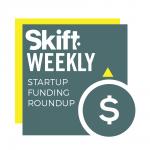Skift Take
Nine travel startups have recently announced more than $43 million in funding, collectively. Concepts include virtual interlining for airlines, management software for travel agents, and booking services for places like Namibia and South Korea.

Travel Startup Funding This Week
Each week we round up travel startups that have recently received or announced funding. Please email Travel Tech Reporter Justin Dawes at [email protected] if you have funding news.
Ten travel startups have recently announced more than $43 million in funding.
Earlier this week, Skift sister brand Event MB reported on how event platform Bizzabo had raised $138 million in its Series E funding round, led by Insight Partners.
>>Betterwood, a tech-based management service for lifestyle hotel brands, closed a Series A round that was undisclosed but worth “tens of millions of U.S. dollars.”
ZhenFund and INCE Capital participated. ChinaTravelNews first reported the funding.
Betterwood was co-founded by Ocean Link, an investment firm that has received investment from Trip.com Group. Betterwood founder Alex Zheng is a co-founder and partner of Ocean Link and the former founder of Chinese budget hotel brand 7 Days.
Spanish hotel brand Barceló has 50 properties under development with Betterwood, though the brand has mainly franchised through larger developer Plateno. Betterwood also works with other international brands, such as Ruby Hotels and its own brands.
Betterwood has a significant opportunity given the Chinese hotel sector’s ripeness for disruption, said Anna Fang, the founding partner and CEO of ZhenFund, an early-stage venture capital firm in China.
>>Dohop, a travel tech company based in Iceland, has received an unspecified investment from Scottish Equity Partners (SEP). The growth investment was in the “multi-million pound” range according to Northstack. Stuart Paterson, a partner at SEP, will join the Dohop board as a non-executive director.
Dohop has previously disclosed raising about $8 million in funding from investors like EasyJet, according to Crunchbase.
Dohop plans to transform how airlines and other travel providers enable passengers to build complex itineraries. Dohop began as a travel metasearch provider for consumers. Still, its growth business now is so-called virtual interlining technology, which allows airlines to seamlessly connect without needing to sign formal interline or codeshare agreements.
For example, since 2017, EasyJet has run a Worldwide program that sells flights on selected airlines and offers “seamless” connections with its flights. Dohop powers the program.
Dohop also offers a protected connection, which assists passengers with re-booking, accommodation, and other travel services due to a missed connection, schedule change, or canceled flight.
>>Maidbot, an Austin-based company providing commercial service robotics, has closed a Series B round.
Participating investors include Octave Ventures and RB (Reckitt Benckiser), the maker of Lysol. RB has recently established a Global Business Solutions division to support businesses such as Delta, Hilton, and Avis to serve its customers and consumers with enhanced hygiene standards. See our earlier story: “Hilton, Lysol, and the Mayo Clinic Team Up on New Cleaning Standard for Hotels.”
Several large hotel brands have deployed Maidbot’s robot Rosie.
>>ConnexPay, a payment distribution platform digitizing the flow of funds for the travel industry, raised a new injection of funding of $6 million from F-Prime Capital, bringing their total funding amount to $15 million.
ConnexPay says a majority of its clients currently are in the travel sector.
>>Reposite, a maker of software for travel agents and advisors, raised $2.5 million in funding.
Liberty City Ventures led the round in the New York City-based startup. The seed funding adds to investment by Greycroft, Pritzker, and Raine.
Reposite has created web-based software that works as a database that lets travel professionals manage suppliers and clients, track proposals, and better manage their business. Key features include a searchable database of suppliers, tracking of key documents, renewals, payment processing, and custom quotes via in-app messaging.
>>JetCamp, a site for searching and booking campsites, has received an undisclosed early-stage funding from the Austrian/Swiss investment fund Falkensteiner Ventures.
JetCamp said it lists more than 90 percent of all 25,000 European campsites. For consumer marketing, it aims to target Germany and France, Europe’s main camping markets, in the short term. For more on the sector, attend Skift’s online Outdoor Summit on December 10.
>>HiJiffy, a chatbot and communications platform for hotels, has closed a seed round of about $1.2 million (€1 million). HiJiffy said it had grown 115 percent since January.
>>Viatu, a soon-to-launch service for booking adventure, nature, and sustainably-themed travel in Africa, has raised an undisclosed seed round from a number of undisclosed investors.
The team of Viatu, led by founder and CEO Alfredo Seidemann, comprises former executives in travel, ex-Google employees, and Booking.com engineers. Based in Zug, Switzerland, it has a goal of promoting sustainable travel. It will start by offering Namibia travel in early 2021.
>>Outdoorsy, a peer-to-peer marketplace for recreational vehicle (RV) rentals, has received additional investment from The London Technology Club (LTC) and Autotech Ventures. More on Outdoorsy, here. For more on the sector, attend Skift’s online Outdoor Summit on December 10.
>>Storicity, which offers a recommendations for travel itineraries and makes reservations, raised seed funding from accelerator 500 Startups, Platum reported. The startup, led by CEO Sang-wook Park, offers a chatbot style service has a digital guide named Yeoda, to echo the name of Star Wars character Yoda.
Skift Cheat Sheet:
We define a startup as a company formed to test and build a repeatable and scalable business model. Few companies meet that definition. The rare ones that do often attract venture capital. Their funding rounds come in waves.
Seed capital is money used to start a business, often led by angel investors and friends or family.
Series A financing is typically drawn from venture capitalists. The round aims to help a startup’s founders make sure that their product is something that customers truly want to buy.
Series B financing is mainly about venture capitalist firms helping a company grow faster. These fundraising rounds can assist in recruiting skilled workers and developing cost-effective marketing.
Series C financing is ordinarily about helping a company expand, such as through acquisitions. In addition to VCs, hedge funds, investment banks, and private equity firms often participate.
Series D, E and beyond These mainly mature businesses and the funding round may help a company prepare to go public or be acquired. A variety of types of private investors might participate.
The Daily Newsletter
Our daily coverage of the global travel industry. Written by editors and analysts from across Skift’s brands.
Have a confidential tip for Skift? Get in touch
Tags: funding, startups, vcroundup
Photo credit: An image of a guest room at the Amber Hotel in Guiyang, China, that's managed by Betterwood Lifestyle Lab, a company that has received a Series A round of investment. Betterwood
